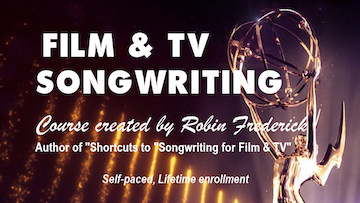Your song is finished. You like what you’ve written. You think it has commercial potential. So, what do you do next? You pitch your songs to music industry markets where you think it will be successful.
Take a look at your pitching options.
You can start by pitching it directly to music publishers or, in today’s Internet-driven music business, you might decide to create a buzz around your song on a site like YouTube. If you are a singer-songwriter or band, you can digitally release your music through streaming sites like Spotify and Apple Music. If you’ve ever heard a song in a TV show, film, or TV commercial, you might wonder how to get your song how to get your song into one of those. To do that, you’ll need to pitch a broadcast quality recording of your song to a music library like Crucial Music or directly to a music supervisor.
Here are six tips for increasing your chances of finding a home for your song in any sector of the music business.
1. Know what GENRE you’re writing in.
For the best chance of success, write your songs in a contemporary style that you hear on the radio or on film and TV. Music publishers and music supervisors look for songs that appeal to an established audience. If you fit in to a style with proven appeal, you’ll have a better chance of a successful pitch.
This doesn’t mean you should write a song in a style you don’t like or don’t feel comfortable with. Stay true to your emotions and themes, but you can make small decisions as you go along that will steer your song toward a more marketable sound if you keep a genre in mind as you go along.
For the best result, ask yourself what genre you want to write in BEFORE you write your song. Then you’ll be able to shape your song as you go along. Then, when a music publisher asks you what current style you’re writing in, or what artist do you sound like, you’ll have your answer ready.
Find out how to break down a genre and study it.
2. Aim your song toward a USE.
Will you pitch to film & TV music libraries? Or pitch to other artists through a music publisher or personal contact? Or perform it in your own live shows? Each of these songs has to perform a different job. This will suggest, for example, how big and catchy your chorus needs to be. For an artist looking for a hit single, think big, irresistibly hum-able chorus. For a film & TV song, you can keep it more low key and intimate.
A great song that works for one type of use may not work well for a different use. Just because a song isn’t a hit single, doesn’t mean it isn’t a great song. Maybe it would be perfect under a scene in a prime time TV series. Study songs that are successful in the market you want to write for and learn from them.
Learn to write songs for movies and TV shows in my low-cost course with scenes to practice to…
3. Know which contemporary artists are similar to you.
The first thing the music industry will ask is ‘who do you sound like’ (if you’re an artist) or ‘what genre or artist do your songs sound like?’ This is standard shorthand for the industry so be ready with an honest, accurate answer. It’s not that they want you to copy or sound exactly like someone else, but they need a ballpark so they can quickly assess whether you fit into their current needs.
4. Test your song with a simple, clean demo.
Get feedback from knowledgeable people in the industry. Try a pitch sheet with feedback like TAXI.com. Did you know you can get feedback from a good publisher for a fee? Check out Dale Kawashima’s website, SongwriterUniverse.com. Jason Blume, author and hit songwriter, offers critiques at JasonBlume.com.
Read this tip for more info on making a basic demo.
5. Copyright your song.
Before you post your song online or send it to a music publisher, copyright it. It’s one a simple step you can take that will help you sleep better at night knowing you have some protection. You’ll find complete instructions and online forms at www.Copyright.gov. Save money and copyright a group of songs on a single form for one fee.
6. Pitch your song!
Once you’re armed with the answers to the genre and similar artist questions and you know what use you want to aim for, then try a pitch service like TAXI.com which lists opportunities in all of the markets I’ve mentioned. There are good Film & TV music libraries will accept online submissions. Crucial Music is one of my favorites.
Or you can go the DIY route. This is time consuming but do-able. Try one of the directories available at MusicRegistry.com. The contact info for A&R execs and Music Supervisors is as current as you can get.
The Songwriter’s Market is an annual publication with a huge directory of music publishers, complete with contact information. You can buy it at Amazon.com or check your local library. Look through the list of music publishers. Check to see if they accept unsolicited material. (The listing will tell you.) Look up the publisher online before submitting any songs. Find out which genres they specialize in and which songs have been successful for them. If they only handle the Country music market, don’t submit a Pop song. They may not have the expertise to work a song in that market.
There are also free directories published by Music Connection magazine. You can find out more on their website.
Here are more ideas and resources for pitching your song.
Send your email. The best way to approach a contact is with a polite, well-informed email. Let them know you’re familiar with their work or their catalog and you feel you have music that could fit their needs. Remember, it’s about what you can do for them, not what you they can do for you. Include a short bio with any track record, touring, and fan base info. Keep it relevant. They don’t need to know how old you were when you started playing guitar or where you went to high school.
- Record labels & publishers: If you’re pitching to a record label or publisher as an artist or band, ask if you can send your CD. Many publishers and record labels will not accept unsolicited submissions, so check with them first and follow their instructions. (A directory will usually tell you whether the contact company will or won’t accept unsolicited material.)
If sending a package, include a CD and brief, well-organized promotional materials with info on touring, fan base, and radio airplay. An email is often a good way to introduce yourself initially. Include a link to your web page where they can listen and read more if they’re interested.
Labels and publishers are looking for artists who have already made some inroads into a the market and laid the groundwork. A well-designed, dedicated website is a must. Make it easy to access (no login or registration needed) and easy to navigate.
- Music supervisors: There’s some discussion over whether to include mp3s of your music as an attachment with your email. If someone requests an attachment, of course, that’s what you should do. Most of the music supervisors I’ve talked to prefer a link to your music. Soundcloud.com is a good option. You can include a description with lyrics, make the file downloadable, and include your contact info. Choose “Private” and you can share a link that only the music supervisor will be able to access. Or link directly to a page on your website where they can listen to specific songs that you’ve written with film & TV uses in mind. Don’t just send a link to your home page unless that’s also your listening page. A brief bio on the page with relevant info on touring, placements, and fan base can be helpful.
If you’re pitching to all three – record labels, publishers, and music supervisors – you might want to dedicate a page on your web site to each use. The songs that work well for radio are not always the ones that work best for film & TV uses.
Good luck pitching your songs!
by Robin Frederick







